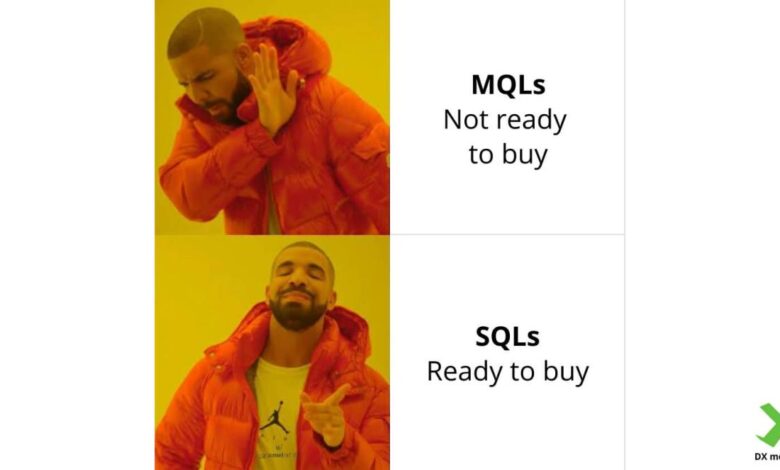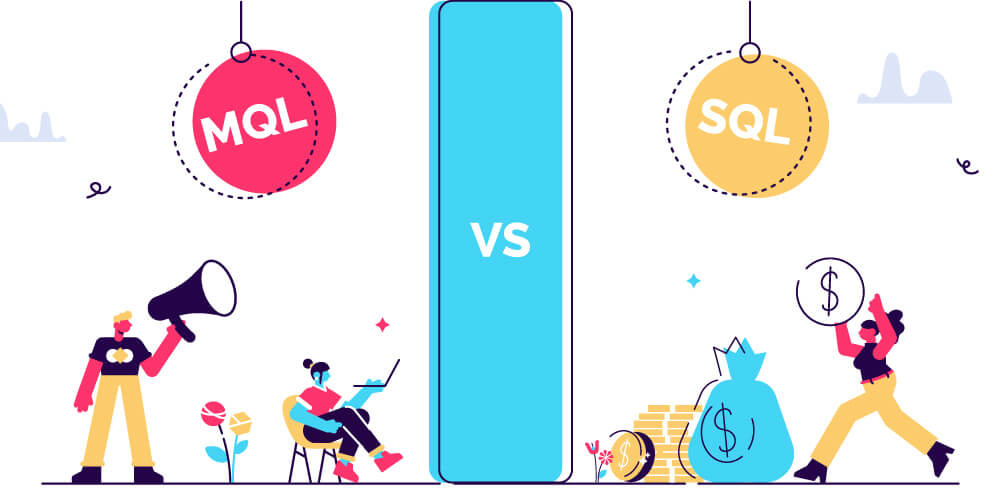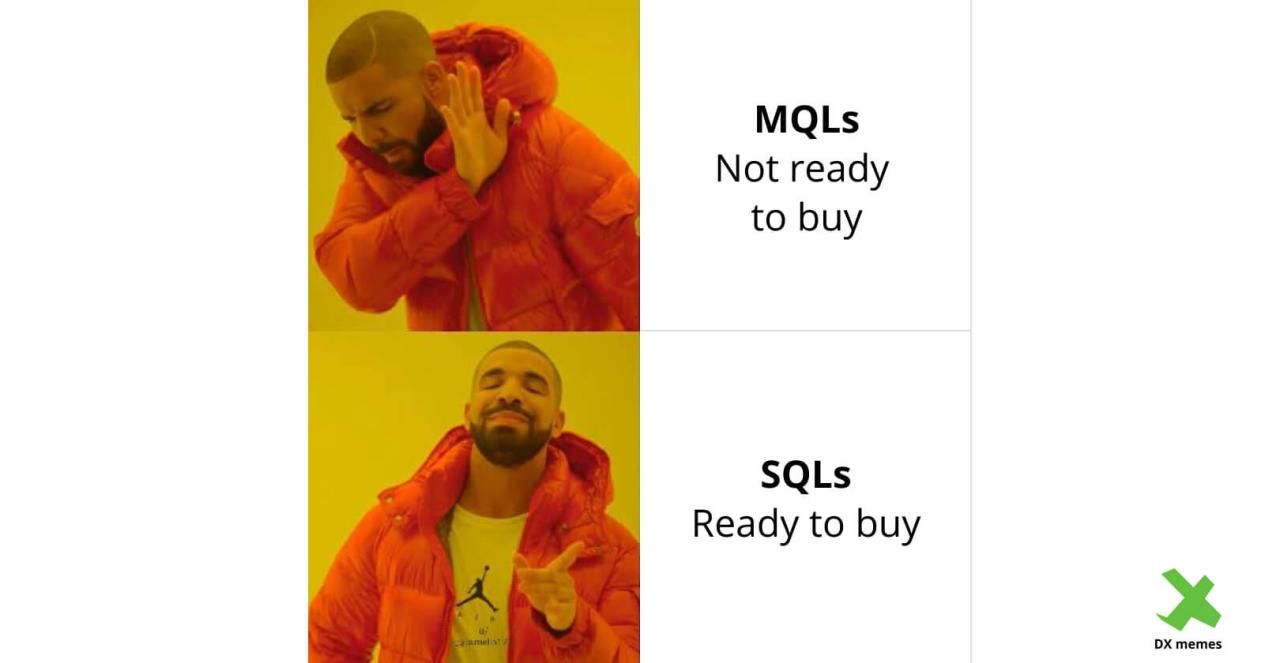
MQL vs SQL Understanding Lead Qualification
MQL vs SQL, a critical distinction for marketers and sales teams. This breakdown clarifies the nuances between Marketing Qualified Leads (MQLs) and Sales Qualified Leads (SQLs), crucial for effective lead management. Understanding their differences is key to optimizing marketing and sales strategies. MQLs represent potential customers identified by marketing based on their engagement with marketing materials. SQLs, however, represent more advanced prospects ready to engage with sales teams.
We’ll explore how these leads are identified, categorized, and utilized throughout the sales funnel, and the crucial role of data collection and analysis in refining your marketing and sales performance. From technology applications to CRM systems, we’ll unravel the value of each lead type in various contexts.
The process of qualifying leads, from initial marketing engagement to a sales-ready stage, is a multifaceted endeavor. MQLs are typically identified based on factors like website activity, content downloads, and email interactions, while SQLs are identified through more in-depth conversations and demonstrations of a clear need. This process is vital for streamlining the sales process, focusing efforts on the most promising leads, and ultimately maximizing ROI.
Introduction to MQL and SQL
Marketing and sales teams often use various tools and methodologies to identify and qualify potential customers. Understanding the nuances of lead qualification is crucial for efficient resource allocation and achieving desired outcomes. Two key concepts in this process are MQL (Marketing Qualified Lead) and SQL (Sales Qualified Lead), each playing a specific role in the sales funnel. This section provides a comprehensive overview of both MQL and SQL, highlighting their distinct purposes and characteristics.MQLs and SQLs are vital components of a successful lead management system.
By clearly defining and differentiating these stages, businesses can optimize their sales and marketing efforts.
Definition of MQL
A Marketing Qualified Lead (MQL) represents a potential customer who has demonstrated sufficient interest in a company’s products or services to warrant further engagement by the marketing team. This interest typically involves specific actions, such as downloading a white paper, registering for a webinar, or visiting product pages. In essence, an MQL signifies that a prospect has moved beyond general awareness and exhibits a higher level of interest.
Definition of SQL
A Sales Qualified Lead (SQL) is a potential customer who has demonstrated the characteristics of a likely purchaser. This stage goes beyond general interest and indicates that a prospect is actively considering a purchase and is receptive to a sales conversation. SQLs often exhibit specific needs and budget considerations that suggest a strong likelihood of conversion.
Core Purpose of MQL and SQL
The primary purpose of an MQL is to identify and prioritize leads who are most likely to convert into paying customers. By focusing on qualified leads, marketing teams can allocate resources more effectively and avoid wasting time and effort on unqualified prospects. Conversely, the core purpose of an SQL is to streamline the sales process by passing qualified leads to the sales team for immediate follow-up.
This ensures the sales team can concentrate on leads most likely to result in a sale, increasing their efficiency and conversion rates.
Key Differences Between MQL and SQL
The primary difference lies in the level of qualification. MQLs are qualified by marketing criteria, focusing on initial interest and engagement. SQLs, however, are qualified by sales criteria, focusing on factors that suggest a strong likelihood of purchase, such as budget, timeline, and specific needs. This distinction is crucial for effective lead management and efficient resource allocation.
Quick question: MQL vs SQL? It’s a common debate, but the real-world application is fascinating. Think about how Marcel Marcondes, CMO of Anheuser-Busch, a prominent figure in the marketing world , likely uses these tools to drive sales strategies. Ultimately, understanding the nuances of MQL and SQL is key to effective lead generation and customer relationship management.
Comparison Table: MQL vs. SQL
| Feature | MQL (Marketing Qualified Lead) | SQL (Sales Qualified Lead) |
|---|---|---|
| Definition | A potential customer who has shown interest in a company’s products/services through specific actions (e.g., downloading a whitepaper, attending a webinar). | A potential customer who has demonstrated characteristics of a likely purchaser (e.g., specific needs, budget, timeline). |
| Purpose | Identify and prioritize leads for further marketing engagement. | Streamline the sales process by passing qualified leads to the sales team. |
| Key Characteristics | Demonstrates interest, engagement, and intent to learn more. Typically based on marketing-driven criteria. | Demonstrates strong purchase intent, often based on specific needs and budget considerations. Usually determined by sales criteria. |
MQL vs. SQL in Marketing
Marketing teams often grapple with identifying and nurturing potential customers. Understanding the difference between Marketing Qualified Leads (MQLs) and Sales Qualified Leads (SQLs) is crucial for efficient lead management and optimized marketing strategies. This distinction allows teams to focus resources effectively, leading to higher conversion rates and improved ROI.Identifying and qualifying leads at different stages of the customer journey is key to efficient lead management.
This process involves various criteria and analyses to determine the likelihood of a lead converting into a paying customer. This understanding enables teams to focus their efforts on those most likely to convert.
MQL Identification and Use in Marketing Strategies
MQLs represent individuals who have shown initial interest in a company’s products or services, often through interactions like downloading resources, attending webinars, or filling out forms. These leads are typically identified using a combination of automated tools and human judgment. For example, a lead who downloads a white paper demonstrates interest and is categorized as an MQL. MQLs are used in marketing strategies to further nurture leads and move them toward becoming SQLs.
Marketing teams can segment MQLs based on their demonstrated interests and use targeted content to educate and persuade them further.
SQL Identification and Use in Marketing Strategies
SQLs are leads that have progressed further down the sales funnel and are more likely to convert into paying customers. They demonstrate a higher level of interest and commitment, often exhibiting specific needs and desires that align with the company’s offerings. For example, a lead who has engaged with several sales materials, attended multiple webinars, and actively requested a demo is likely an SQL.
SQLs are typically identified by sales teams, often using criteria like specific needs, budget, and decision-making authority. Sales teams utilize SQLs to initiate conversations and close deals.
Comparison of Stages in the Customer Journey
MQLs are typically encountered earlier in the customer journey, indicating initial interest. SQLs represent a more advanced stage, demonstrating a stronger commitment to the company’s offerings. This difference in stages often aligns with the stages in a typical sales funnel. For instance, a lead who signs up for a newsletter is likely an MQL, while a lead requesting a personalized product demonstration is likely an SQL.
How Marketing Teams Utilize Data from MQLs and SQLs
Marketing teams use data from MQLs and SQLs to refine their strategies. Analyzing the characteristics of these leads helps to identify patterns in customer behavior. For example, if a significant number of MQLs are coming from a specific demographic, marketing teams can tailor their messaging and content to better resonate with that group. Similarly, understanding the specific needs and pain points of SQLs enables targeted campaigns to persuade them further down the sales funnel.
Understanding these patterns improves the efficiency of marketing strategies and better targets the audience.
Typical Stages in a Sales Funnel
| Stage | Description | MQL | SQL |
|---|---|---|---|
| Awareness | Initial interest, lead discovery | High | Low |
| Interest | Lead engages with more content | High | Medium |
| Decision | Lead considers options, research | Medium | High |
| Action | Lead takes a concrete action (purchase) | Low | High |
This table illustrates the typical stages in a sales funnel where MQLs and SQLs might be categorized. The stages are crucial in understanding the progression of a lead from initial interest to a paying customer. This data enables marketing teams to optimize their efforts at each stage, maximizing conversion rates.
MQL vs. SQL in Sales

Marketing Qualified Leads (MQLs) and Sales Qualified Leads (SQLs) are crucial distinctions in the sales pipeline. Understanding the nuances between these lead types allows sales teams to focus their efforts effectively, leading to higher conversion rates and more efficient use of resources. This section delves into how sales teams utilize MQL and SQL data, highlighting the value of each in the sales process and demonstrating how to prioritize leads based on their classifications.Sales teams rely on both MQL and SQL data to navigate the complex sales funnel.
By understanding the characteristics and behaviors of each type of lead, sales representatives can tailor their approach and allocate time strategically.
How Sales Teams Use MQL Data
MQL data is primarily used by sales teams to identify potential customers who demonstrate strong interest in a company’s products or services. This data typically includes information gathered through marketing efforts, such as website visits, form submissions, and engagement with marketing materials. Sales teams use this information to prioritize leads that are most likely to convert into paying customers.
- Sales teams use MQL data to segment leads based on their interaction with marketing materials. For instance, a lead who downloaded a whitepaper is a more qualified lead than one who simply visited the company website.
- Sales teams use MQL data to identify leads who are likely to be receptive to sales outreach. This allows for more targeted and effective sales pitches.
- Sales teams use MQL data to identify trends and patterns in customer behavior, helping them understand what marketing campaigns are resonating most effectively with potential customers.
How Sales Teams Use SQL Data
SQL data is used by sales teams to identify leads who are ready to make a purchase decision. This data is typically gathered through sales interactions and further qualification steps. Sales teams use this data to identify and focus on the most promising prospects.
Quick question: MQL vs SQL – what’s the difference? It’s a common marketing conundrum, and understanding the nuances can be key to effective lead nurturing. Recently, I was reading about Dara Treseder, CMO at Peloton Ignite, who was named Marketer of the Week here. Her insights on lead generation strategies, particularly around qualifying leads, might just help you decipher the MQL vs SQL debate! Ultimately, knowing the difference between these two is critical to any successful marketing campaign.
- Sales teams use SQL data to understand the specific needs and pain points of their leads. This data helps sales representatives tailor their approach to address those specific concerns and position their solutions as the best fit.
- Sales teams use SQL data to assess the lead’s budget, timeline, and decision-making authority. This allows sales representatives to understand the lead’s buying power and the urgency of the situation.
- Sales teams use SQL data to determine the lead’s willingness to engage with sales representatives. This data can be collected through various sales interactions, such as phone calls, meetings, and email exchanges.
Value of MQL and SQL Data in the Sales Process
MQLs and SQLs both play distinct but essential roles in the sales process. MQLs provide a starting point for sales teams, focusing their efforts on leads showing initial interest. SQLs represent the highest-potential customers, requiring a more targeted and personalized sales approach. The value of each type of lead is determined by the stage of the sales funnel.
Comparison of Actions for MQLs and SQLs
The actions taken by sales teams with MQLs and SQLs differ significantly. MQLs typically receive initial outreach and qualification steps, whereas SQLs receive more tailored and personalized interactions.
- Sales teams use MQLs to determine if there is a genuine interest in the product or service. This often involves sending introductory emails or scheduling preliminary calls.
- Sales teams use SQLs to focus on closing the deal. This typically involves in-depth conversations, presentations, and proposals tailored to the lead’s specific needs.
Prioritizing Leads Based on MQL and SQL Classifications
The following table demonstrates a method for prioritizing leads based on MQL and SQL classifications. A numerical score reflects the potential value of the lead, guiding sales teams in allocating their time and resources.
| Lead Type | Criteria | Score | Action |
|---|---|---|---|
| MQL – High Engagement | High website activity, downloaded multiple resources | 8 | Schedule initial call, gather more information |
| MQL – Medium Engagement | Visited website, downloaded one resource | 6 | Send introductory email, gauge interest |
| MQL – Low Engagement | Simple website visit, no downloads | 4 | Monitor activity, consider nurturing |
| SQL – High Potential | Budget identified, decision-maker involved | 10 | Schedule meeting, present solution |
| SQL – Medium Potential | Budget discussed, some questions | 8 | Follow-up call, clarify needs |
| SQL – Low Potential | General interest, no clear budget | 6 | Nurture, re-engage at a later stage |
MQL and SQL Data Collection
Collecting accurate and relevant data is crucial for effective marketing and sales strategies. MQLs (Marketing Qualified Leads) and SQLs (Sales Qualified Leads) represent different stages of the customer journey, requiring distinct data collection methods. Understanding these differences and the importance of data accuracy will help organizations nurture leads effectively and optimize conversion rates.
Methods for Collecting MQL Data
Gathering MQL data involves capturing information from various touchpoints across the marketing funnel. This includes activities like website interactions, content downloads, email engagement, and participation in webinars. Accurate data collection enables marketers to identify potential customers who demonstrate interest in their products or services.
- Website Analytics: Tracking website traffic, page views, time spent on pages, and specific content interactions provides valuable insights into user behavior. Tools like Google Analytics, HubSpot, and similar platforms collect and analyze this data. This helps identify which marketing campaigns are generating the most qualified leads.
- Lead Forms and Surveys: Collecting information through forms on landing pages and interactive surveys enables marketers to gather detailed information about potential customers. The data collected should align with the specific needs of the marketing and sales teams.
- Marketing Automation Platforms: Marketing automation platforms like HubSpot and Marketo track interactions with marketing materials. These systems automatically categorize and qualify leads based on pre-defined criteria, reducing manual effort and improving efficiency.
- Event Registrations: Registrations for webinars, conferences, or other events often provide valuable information about potential customers, including their industry, job title, and company size. Event registration data often provides a high level of qualification.
Methods for Collecting SQL Data
Collecting SQL data focuses on qualifying leads further by assessing their readiness and intent to purchase. The methods used typically involve more in-depth interactions and a higher level of engagement than MQL data collection.
Quick question: MQL vs. SQL? It’s a common marketing debate, and understanding the difference is key. For instance, Amber Theinert, marketing manager at Ted’s Cafe, highlights the importance of clear strategies in this area. Ultimately, mastering both MQL and SQL is vital for successful lead nurturing and conversion.
It’s all about knowing your target audience and how best to reach them, no matter what tools you’re using.
- Sales Calls and Meetings: Direct interaction with potential customers through sales calls and meetings allows sales representatives to assess their needs and identify potential objections. This helps gauge their readiness to purchase and the urgency of their need.
- Sales CRM Data: Sales CRM systems track interactions with potential customers. Data fields specific to the sales process, such as deal size, potential close date, and product interest, are critical to qualifying leads as SQLs.
- Sales Qualified Lead (SQL) Forms: Using dedicated forms specifically designed for sales qualification helps sales representatives gather detailed information about potential customers, allowing for a focused approach. These forms are tailored to capture the specific details required for sales qualification.
- Customer Relationship Management (CRM) Systems: CRM systems provide a comprehensive view of the customer journey. Data on past interactions, purchase history, and support requests can be used to further qualify leads as SQLs.
Comparison of Data Collection Methods and Tools
| Method | Purpose | Example |
|---|---|---|
| Website Analytics | Track website interactions to identify potential MQLs | Google Analytics tracking page views and time spent on specific product pages. |
| Lead Forms | Gather detailed information about potential MQLs | Landing page form collecting contact information and desired product features. |
| Sales Calls | Assess customer needs and identify potential objections to qualify leads as SQLs. | Sales representative calling a potential customer to understand their current software and its limitations. |
| CRM Systems | Track interactions and gather comprehensive customer information for both MQL and SQL qualification | Salesforce CRM tracking interactions with a potential customer and recording their past purchases. |
Importance of Data Accuracy
Data accuracy is paramount in both MQL and SQL collection. Inaccurate data leads to misdirected marketing efforts and wasted sales resources. Ensuring data quality involves verifying information, maintaining data integrity, and establishing clear data collection procedures. This reduces wasted time and resources by avoiding unqualified leads.
Accurate data collection is the foundation of effective lead nurturing and conversion.
MQL and SQL in Technology

In the dynamic landscape of software and technology, understanding the nuances of Marketing Qualified Leads (MQLs) and Sales Qualified Leads (SQLs) is crucial for success. These lead qualification stages play a pivotal role in optimizing sales funnels, aligning marketing efforts with sales strategies, and ultimately driving revenue growth. This exploration delves into how MQLs and SQLs are leveraged in technology contexts, including their applications in product development and CRM systems, as well as comparing their usage across various technology applications.
MQL and SQL Utilization in Software and Technology
MQLs and SQLs represent distinct stages in the sales funnel, with MQLs indicating a potential customer’s interest in a product or service, and SQLs demonstrating a higher likelihood of converting into a paying customer. Technology companies utilize these classifications to efficiently target their marketing and sales resources. For instance, MQLs might be nurtured through targeted content marketing campaigns, while SQLs would be prioritized for personalized sales outreach.
Impact on Product Development
MQL and SQL data are invaluable resources for informing product development strategies. By analyzing the characteristics of leads who convert into customers (SQLs), companies can identify unmet needs and market gaps. Detailed insights into customer preferences and pain points, gleaned from both MQL and SQL data, allow for the development of products and features that address specific customer requirements, leading to higher customer satisfaction and increased sales.
Role in CRM Systems, Mql vs sql
MQL and SQL data are fundamental components of robust Customer Relationship Management (CRM) systems. These systems use this data to track customer interactions, segment audiences, and personalize communication strategies. For instance, CRM systems can automatically route SQLs to the appropriate sales representatives, streamlining the sales process and improving response times.
Comparison Across Technology Applications
The application of MQL and SQL data varies across different technology sectors. A SaaS company, for example, might focus on MQLs exhibiting interest in free trials or webinars, while a hardware company might prioritize SQLs who have downloaded product specifications or requested demos. The key lies in understanding the specific needs and behaviours of target customers within each sector.
Illustrative Table of Tech Company Usage
| Tech Company Type | MQL Focus | SQL Focus | Data Use Case |
|---|---|---|---|
| SaaS | Free trial sign-ups, webinar attendance, downloaded product demos | Completed trials, product demos with purchase intent, engagement with sales team | Tailoring marketing campaigns, personalizing onboarding experiences, improving product features |
| Hardware | Downloads of specifications, product inquiries, demo requests | Completed demos, requests for quotes, signed contracts | Prioritizing sales outreach, optimizing product configurations, enhancing after-sales support |
| Enterprise Software | Engagement with case studies, white papers, and product documentation | Formal proposals, executive engagement, signed contracts | Targeted content marketing, personalized account management, strategic partnership development |
MQL and SQL in Customer Relationship Management (CRM): Mql Vs Sql
Marketing Qualified Leads (MQLs) and Sales Qualified Leads (SQLs) are crucial for effective lead management. CRM systems provide the structure and tools to track, manage, and nurture these leads through the sales funnel, ultimately improving conversion rates and revenue. Understanding how CRM platforms integrate with MQL and SQL data is vital for organizations seeking to optimize their marketing and sales efforts.CRM systems are designed to centralize information about leads, customers, and interactions.
By incorporating MQL and SQL data into this centralized system, businesses gain a comprehensive view of their sales pipeline. This integrated approach allows for more efficient lead nurturing, improved sales forecasting, and ultimately, a more profitable business model. This integrated approach enables businesses to better understand their customer journey and refine their marketing and sales strategies accordingly.
Role of MQLs and SQLs in CRM Systems
MQLs and SQLs serve as crucial milestones in the customer journey, indicating different stages of engagement and qualification. Within a CRM, these leads are categorized, tracked, and analyzed to understand their progression through the sales pipeline. The CRM system facilitates communication and collaboration between marketing and sales teams, ensuring seamless handoff and consistent messaging.
How CRM Platforms Can Track MQLs and SQLs
CRM platforms offer various features to track MQLs and SQLs. Custom fields can be created to categorize leads based on specific criteria, such as source, demographics, or engagement level. Activity tracking within the CRM can record interactions like email opens, website visits, or form submissions. Automated workflows can be set up to trigger specific actions based on lead status, such as sending follow-up emails or assigning leads to sales representatives.
For example, if a lead fills out a specific form, an automated workflow can be triggered to assign that lead to a sales representative for follow-up.
How CRM Systems Segment and Prioritize Leads
CRM systems enable the segmentation and prioritization of leads based on MQL and SQL criteria. By analyzing data like demographics, engagement history, and desired products or services, CRM systems can categorize leads into specific groups. This segmentation allows for targeted marketing campaigns and personalized communication. Prioritization features can rank leads based on factors such as lead score, predicted value, or time sensitivity.
This data-driven approach enables sales teams to focus their efforts on the most promising leads. For instance, leads exhibiting high engagement with specific products might be prioritized over leads who have shown little interest.
Examples of CRM Software Handling MQLs and SQLs
Various CRM software solutions provide robust functionalities for managing MQLs and SQLs. For example, Salesforce allows for creating custom fields to track MQL and SQL data, setting up automated workflows, and analyzing lead engagement metrics. HubSpot CRM provides similar capabilities with features for lead scoring, segmentation, and reporting. These platforms empower companies to track and manage the entire sales pipeline, from initial marketing engagement to final sale.
Other CRM systems, like Zoho CRM and Microsoft Dynamics 365, also offer similar features for managing MQLs and SQLs.
Comparison of CRM Tools for MQL and SQL Data
| CRM Tool | MQL Tracking | SQL Tracking | Lead Segmentation | Lead Prioritization |
|---|---|---|---|---|
| Salesforce | Excellent; custom fields, automation | Excellent; detailed qualification criteria | Advanced segmentation based on various factors | Lead scoring and probability models |
| HubSpot | Good; free plan with basic tracking | Good; qualification criteria, contact management | Good; customizable segmentation rules | Lead scoring, automatic assignment |
| Zoho CRM | Good; customizable fields, workflows | Good; sales-specific features, advanced tracking | Good; customizable lead lists, reporting | Lead scoring, custom rules |
| Microsoft Dynamics 365 | Excellent; robust features, integration | Excellent; detailed qualification criteria, sales pipeline management | Advanced segmentation based on various factors | Lead scoring, sales forecasting tools |
Summary
In conclusion, differentiating between MQLs and SQLs is paramount for effective lead management. This exploration of MQL vs SQL has highlighted the key distinctions, usage in various stages of the customer journey, and the role of data collection, analysis, and CRM systems in optimizing lead qualification and nurturing prospects. Ultimately, accurate identification and prioritization of leads through MQL and SQL classifications are vital for improved marketing and sales efficiency, driving better conversion rates and higher returns on investment.





